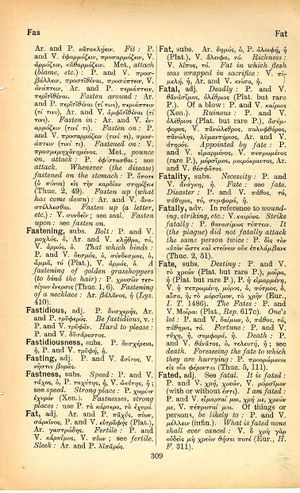fated: Difference between revisions
From LSJ
πολλὰ δ' ἄναντα κάταντα πάραντά τε δόχμιά τ' ἦλθον → and ever upward, downward, sideward, and aslant they went
(Woodhouse 3) |
(CSV4) |
||
| Line 1: | Line 1: | ||
{{ | {{Woodhouse1 | ||
| | |Text=[[File:woodhouse_309.jpg|thumb|link={{filepath:woodhouse_309.jpg}}]]'''adj.''' | ||
See [[fatal]]. | |||
<b class="b2">It is fated</b>: P. and V. χρή, [[χρεών]], V. μόρσιμον (with or without ἐστι). | |||
<b class="b2">I am fated</b>: P. and V. εἵμαρταί μοι, χρή με, [[χρεών]] με, V. πέπρωταί μοι. | |||
Of things or persons, <b class="b2">be likely to</b>: P. and V. μέλλειν (infin.). | |||
<b class="b2">What is fated none shall ever cancel</b>: V. ὃ χρὴ γὰρ οὐδεὶς μὴ χρεὼν θήσει ποτέ (Eur., ''H.F.'' 311). | |||
}} | }} | ||
Revision as of 09:39, 21 July 2017
English > Greek (Woodhouse)
adj.
See fatal. It is fated: P. and V. χρή, χρεών, V. μόρσιμον (with or without ἐστι). I am fated: P. and V. εἵμαρταί μοι, χρή με, χρεών με, V. πέπρωταί μοι. Of things or persons, be likely to: P. and V. μέλλειν (infin.). What is fated none shall ever cancel: V. ὃ χρὴ γὰρ οὐδεὶς μὴ χρεὼν θήσει ποτέ (Eur., H.F. 311).

